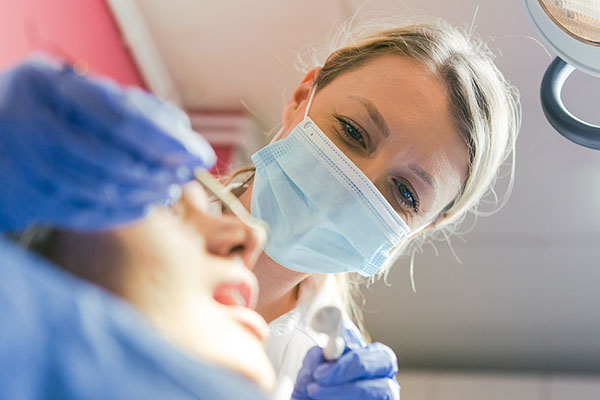Need Scaling and Root Planing? Laser Dentistry Can Help

Laser dentistry provides alternative ways to treat gum disease. Gum disease is caused by tartar and bacterial buildup underneath the gums. It is a condition that damages gum tissues, the ligaments that hold teeth in place and the bone structures that support teeth. The advanced stages of gum disease — called periodontal disease — can lead to teeth becoming loose and falling out.
How laser dentistry improves scaling and root planing
One of the standard ways dentists go about dealing with gum disease is scaling and root planing. The treatment involves the dentist scraping bacteria and tartar off of exposed teeth roots. The procedure is finished up by polishing these surfaces until they are smooth. This makes it harder for bacteria and tartar to stick to these surfaces.
Scaling and root planing are primarily used to treat gum recession and gum disease, but it can also be used to clean tooth roots with hard mineral deposits.
Dentists can use lasers to facilitate scaling and root planing. A dental laser can be used to remove inflamed gum tissues and provide access to tooth roots. They are used to remove tartar from tooth surfaces and to clean out gum pockets. Once the procedure is completed, a clot forms to seal the pocket, and its depth is reduced by reattaching gum tissues to the tooth.
The benefits of using a dental laser during root scaling and planing include:
- The laser seals the gum pocket for up to two weeks, while conventional tools only seal it for about five days
- Dental lasers promote faster re-growth of gum tissues, speeding up the healing process
- The risk of infection is reduced when dental lasers are used
- Patients experience less pain and discomfort after treatments with dental lasers
The laser dentistry process
Here is what patients should expect when getting laser-assisted scaling and root planing:
- A probe is used to evaluate the patient's gum pockets and to determine the extent of any bone loss
- A dental laser is used to remove infected tissues and bacteria
- A scaler is used to remove tartar from teeth and their roots
- A laser is used to finish off the cleaning process and to close up gum pockets
- The healing process begins
- Gum tissues are reattached to teeth, creating healthy pockets
Recovering after gum surgery
There are some simple things patients can do to make their recovery go smoother after gum flap surgery. They can practice good oral hygiene and avoid using tobacco products since they limit the body's ability to heal and fight infections. They should avoid irritating the gum tissues as they heal and get lots of rest since this speeds up recovery.
Taking good care of teeth and gums after getting treatment for gum disease can stop the condition in its tracks and restore healthy gums.
Try laser-assisted scaling and root planing
Call our Lilburn clinic today to learn more about how a dental laser can be used to make scaling and root planing a lot more effective.
Request an appointment here: https://www.lilburnfamilydentistry.com or call Lilburn Family Dentistry at (770) 800-0178 for an appointment in our Lilburn office.
Check out what others are saying about our services on Yelp: Read our Yelp reviews.
Recent Posts
Curious about what a restorative dentist does? Read on to learn more. The unexpected nature of dental injuries can turn ordinary moments into emergencies. These injuries impact oral health and comfort, whether it is from sports mishaps, accidental falls, or an auto accident. A restorative dentist has the skills and tools to repair and restore…
Restorative dentists aim to protect or restore your oral health, function, and appearance. Achieving these goals often involves repairing or replacing missing or damaged teeth. While they offer many restorative services, here are the five most common.A restorative dentist will introduce a dental bridge to ensure the teeth do not shift after a tooth is…
When sudden dental pain occurs, an emergency dentist can provide critical relief and timely treatment. A toothache often appears unexpectedly, disrupting daily activities or restful sleep at night, signaling that you need urgent dental care. Understanding what steps to take when this type of pain occurs can help prevent further complications to your teeth and…
Are you looking for a restorative dentist for your dental needs? Knowing where to start when beginning this search can be difficult, though you can utilize many resources. That said, you will need to consider a few factors when looking for the right dentist. Continue reading to learn more!Here are a few helpful tips for…


